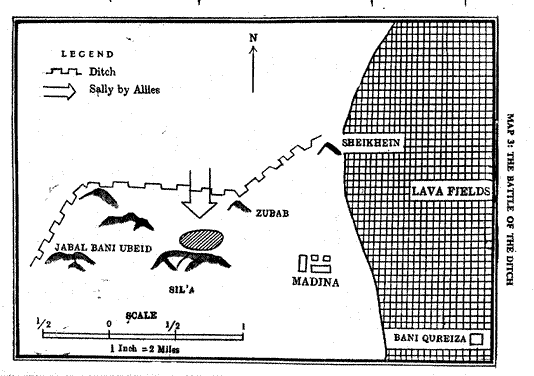|
The ditch ran from Shaikhan
to the hill of Zubab, and thence to the Jabal Bani Ubaid. All these
hills were included in the area protected by the ditch, and on the
west the ditch turned south to cover the left flank of the western
of the two hills known as Jabal Bani Ubaid. East of Shaikhan and
south?west of Jabal Bani Ubaid stretched vast lava fields-areas
of broken, uneven ground covered by, and at times formed of, large
black boulders, impassable for major military movement. A little
south of the centre of the ditch stood the prominent hill of Sil'a,
about 400 feet high, a mile long and a little less across, running
generally north?south but with spurs extending in all directions.
In fact the little hill of Zubab lay just off the north?eastern
spur of Sil'a, though our map does not show this clearly. (See Map
3 below) 1

Once the digging of the
ditch was complete, the Muslims established their camp just ahead
of the hill of Sil'a. Their total strength was 3,000 which included
Hypocrites whose fighting value and reliability were uncertain.
The Prophet's plan was to keep the bulk of his army uncommitted
to strike at any spot where the enemy managed to get a foothold
across the ditch. To guard against surprise, the ditch was lightly
covered along its entire length by 200 men, most of whom were placed
as picquets on the hills commanding the ditch. A mobile force of
500 men was employed to patrol the various settlements of Madinah
and deal with any infiltrators who might enter unseen, and also
give some protection to areas not covered by the ditch. (Madinah
was not then a city as it is now but consisted of a group of settlements
and forts. The centre of Madinah, physical and spiritual, was the
Prophet's Mosque.) The women and children were placed in forts and
houses away from the main front, which faced north and north?west.
The winter that was now passing had been
a severe one. It was also to prove a long winter.
When the Quraish saw the ditch they were
first dismayed and then moved to indignation. They had come in such
strength that victory had seemed certain. Abu Sufyan had joyfully
expected to fight a victorious battle, and now here was this blessed
ditch in the way!
"By Allah!" Abu Sufyan
exploded. "Such stratagems are not the way of the Arab!"
2 In the simple mind of the average Arab
there was no room for such tactics. To the chivalrous Arab this
was definitely 'not cricket'?
However, the Allies moved up their camp,
deployed along the ditch on the north and north?west, and settled
down to a siege that was to last 23 days. By day the Allies would
come up to the ditch which the Muslims covered lightly from the
home side. There would be an exchange of archery which would go
on for most of the day, and for the night the Allies would return
to their camp. Mostly by day and sometimes by night, Allied patrols
would move up and down the ditch trying to find a place at which
a crossing could be attempted. They were eventually to find one
such place, but more of that later.
For 10 days the siege continued with no
decision and no let?up on either side. The morale of both sides
came under considerable strain, but tended to harden rather than
weaken. The Muslims began to feel the pangs of hunger. There were
no large stocks of food in Madinah, and the Muslims were now on
half rations. The Hypocrites became louder and more open in their
criticism of the Prophet. While the ditch was being dug, the Prophet
had promised the Muslims that within a few years they would destroy
the might of Rome and Persia and possess themselves of the wealth
of those empires. The Hypocrites now began to say, "Muhammad
promises us the treasures of Caesar and Chosroes, but he cannot
get us out of this simple predicament!" 3
The true Believers, however, remained firm and steadfast, and their
faith in their leader remained unshaken.
The situation gradually worsened for the
Allies too, so that discontent raised its head in their ranks. The
Arabs were not used to long sieges and preferred a quick, lively
battle to this form of warfare. The weather had remained unpleasant
and began to cause a good deal of distress among the Allies. Food
also ran short, as Abu Sufyan had made no arrangements for provisions
to tide them over such a long period of time. But since the Allies
were not themselves under siege some measures were hastily taken
to gather provisions from outlying areas. The men began to grumble
and Abu Sufyan had to think hard to find some way out of this impasse.
Finally, he consulted Huyaiy the Jew, and between them they hit
upon a new plan which showed every promise of success.
1. The western end of the ditch is also
reported to have ended at Mazad. This too is correct, for the three
western hills shown on Map 3-the two southern ones of Jabal Bani
Ubaid and the little one to their north-are also called Mazad.
2. Ibn Hisham: Vol. 2, p. 224.
3. Ibid: Vol. 2, p. 212.
|
